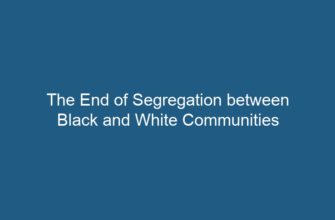Martin Luther King Jr. was a prominent leader in the American civil rights movement during the 1950s and 1960s. He dedicated his life to advocating for racial equality and justice for African Americans. Through his activism, speeches, and nonviolent protests, he sought to achieve several key goals that would transform the United States into a more inclusive and equal society for all its citizens.
The End of Racial Segregation
One of the primary objectives of Martin Luther King was to end racial segregation, which was deeply entrenched in American society at the time. African Americans faced discrimination in various aspects of life, including education, housing, transportation, and public facilities. King believed that racial segregation was a fundamental injustice that needed to be eradicated.
To achieve this goal, King and other civil rights activists organized boycotts, sit-ins, and marches to challenge discriminatory practices and laws. One of the most significant victories in their fight against segregation was the landmark Supreme Court case, Brown v. Board of Education, in 1954, which declared racial segregation in public schools unconstitutional.
Voting Rights for African Americans
Another crucial objective of Martin Luther King was to secure voting rights for African Americans. Despite the constitutional right to vote, many African Americans were systematically denied access to the ballot box through various discriminatory practices such as poll taxes, literacy tests, and intimidation.
King and other civil rights activists organized voter registration drives and protests to draw attention to the disenfranchisement of African Americans. Their efforts culminated in the passage of the Voting Rights Act of 1965, which prohibited racial discrimination in voting practices and provided federal oversight of elections in areas with a history of discrimination.
Martin Luther King, Jr: Crash Course Black American History #36
Economic Equality and the War on Poverty
Beyond racial equality, Martin Luther King also advocated for economic justice and the eradication of poverty. He believed that economic inequality disproportionately affected African Americans and perpetuated racial discrimination.
In his famous speech, “I Have a Dream,” King called for an end to poverty and the creation of equal opportunities for all. He argued that economic injustice undermined the principles of freedom and equality that the United States was founded upon.
To address these issues, King proposed various initiatives, including a guaranteed minimum income, job creation programs, and affordable housing. He believed that these measures would help uplift disadvantaged communities and bridge the economic gap between racial groups.
Nonviolent Resistance and Civil Disobedience
A fundamental principle of Martin Luther King’s activism was the use of nonviolent resistance and civil disobedience as powerful tools for social change. He drew inspiration from Mahatma Gandhi’s philosophy of nonviolence and believed that peaceful protests could bring about lasting transformation.
King and his followers organized numerous peaceful demonstrations, marches, and boycotts to raise awareness about racial inequality and injustice. By embracing nonviolent resistance, they aimed to expose the brutality and immorality of racial discrimination and inspire others to join their cause.
Integration and Brotherhood
Alongside the fight against racial segregation, Martin Luther King advocated for the integration of African Americans into all aspects of American society. He believed in the importance of embracing diversity and fostering a sense of brotherhood among all races.
King envisioned a society where individuals were judged not by the color of their skin but by the content of their character. He worked tirelessly to break down barriers that separated racial groups and promote understanding, empathy, and equality.
Recognition and Legacy
Martin Luther King’s efforts and sacrifices were not in vain. His leadership and activism helped bring about significant changes in American society. His contributions were recognized with numerous awards and honors, including the Nobel Peace Prize in 1964.
King’s legacy continues to inspire generations of activists fighting for justice and equality. His speeches, such as “I Have a Dream,” remain iconic symbols of hope and determination. The Martin Luther King Jr. Memorial in Washington, D.C., stands as a testament to his enduring impact on American history.
Conclusion
Martin Luther King Jr. dedicated his life to fighting for racial equality, voting rights, economic justice, and nonviolent resistance. His vision and leadership played a pivotal role in transforming American society and challenging deeply ingrained racial discrimination. Although his life was tragically cut short, his legacy continues to inspire and guide activists in their ongoing pursuit of a more inclusive and equal world.










